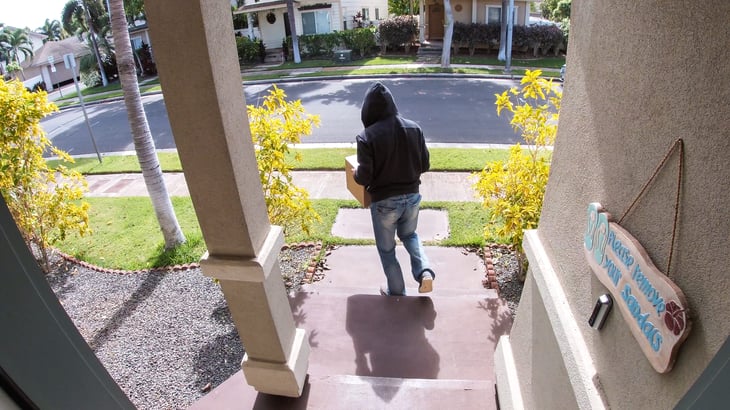
Social media seems to be flooded with viral videos taken from doorbells such Amazon’s popular Ring.
From singing delivery workers and irate neighbors to close encounters with wildlife, these video doorbells promise to give us a glimpse of events we’d never know were happening otherwise.
But is that really reason enough to slap one next to your front door? Turns out, there are actually several reasons why you might not want a video doorbell.
1. Some can be turned against you

It’s all fun and games until someone hacks into your video doorbell system and uses it to spy on you.
Recently, Consumer Reports found that popular doorbells from the manufacturer Eken, which are sold under various brands, had a security flaw that made it easy for other people to access the device and view its videos.
It wasn’t the type of flaw that you needed to be a sophisticated hacker to exploit, either. Anyone who knows where you live and understands the system vulnerabilities — think a stalker or abusive partner — could tap into one of these doorbells.
While Eken says it is working to address the problem, it isn’t the only company to run into security issues. Wyze, which sells video doorbells and surveillance cameras, recently had an incident in which 13,000 accounts were compromised, and users were able to view camera images that were not their own.
Even without these flaws, remember that any electronic device that connects to Wi-Fi can be compromised if you don’t take proper precautions, such as using a strong password.
2. They might bring police to your door

Hackers might not be the only ones looking to access your doorbell videos. The police could ask you to hand them over if they are investigating a crime nearby.
That may not bother you personally, but other people might prefer not to be pulled into an investigation. Digital rights groups and social justice groups both have sounded the alarm that police requests for access to videos unfairly target communities of color, according to Consumer Reports.
Ring, which has partnered with more than 2,500 law enforcement agencies nationwide, seems to be taking these concerns to heart. In January, the company announced that it would discontinue the “Request for Assistance” tool in its Neighbors app that was designed to help facilitate law enforcement access to videos. Now, it appears that a warrant or subpoena will be needed.
3. They aren’t a proven deterrent

Having a video doorbell might make you feel safer, but there really is no proof that they make your community safer.
In 2023, Scientific American conducted a review of available studies and found little to suggest that a video doorbell will make people think twice about robbing your home or committing a crime in your front yard. The publication notes:
“A recently published 40-year systematic review of the effect of closed circuit television on crime found that systems that were actively monitored were associated with a significant reduction in crime, while passively monitored systems were not.”
In other words, if you are watching your doorbell livestream 24/7, you might be able to prevent some crime. But otherwise, don’t count on it.
And in 2018, the MIT Technology Review found that despite claims that Ring doorbells reduced burglaries by up to 55%, break-ins actually decreased the most in neighborhoods without the video doorbells.
4. They could annoy you with false alerts

There is also an annoyance factor that can come with video doorbells. Most send alerts when they detect motion or hear noise, and that can mean many false alarms.
The causes of false alarms are numerous and can include the following:
- Open windows
- Changes in temperature
- Insects
- Bad weather
In support forums, some video doorbell owners report receiving 50 or more false alerts a day despite changing settings to try and minimize them.
5. They could eat up your internet bandwidth

If you have limited internet bandwidth, you may want to consider whether you’d like to use some of that for a video doorbell.
Generally speaking, video doorbells require an internet upload and download speed of 2 Mbps or faster, according to Ring. Then, the amount of bandwidth you use each month will depend on the quality of the videos and how frequently they are recorded.
For instance, Google says its Nest video doorbells can be expected to use anywhere from 2 GB to 300 GB of data each month. On the low end are battery doorbells that use event-based recording at a lower quality. On the high end are wired doorbells that record high quality videos 24/7.
Depending on how much bandwidth your doorbell uses, it could slow down or disrupt the use of other devices in the home. This could affect your ability to stream movies and conduct video calls.
6. They could upset neighbors

There is a good chance your video doorbell isn’t just capturing images of the people at your door. It may also be taking videos of your neighbor walking the dog or the kids playing in the yard across the street.
For this reason, not everyone is thrilled to see a video doorbell pop up on a neighbor’s door. This may be especially true in areas where people are living in close proximity, such as apartment buildings. Not everyone wants to be monitored as they enter and exit their home or have the inside of their residence recorded whenever they open their door.
While not everyone is sympathetic to these concerns, a judgment was entered in the U.K. against a man whose Ring doorbell captured images of his neighbor’s house and garden. To help resolve these sorts of situations, Ring doorbells may allow users to set up privacy zones, which are areas that won’t be monitored. Not all doorbells will necessarily have this feature.
7. They’re kind of creepy

Finally, we come to the reason why I personally don’t have a video doorbell – the need to monitor everything that happens on my street is creepy. It feels a bit Big Brother — or Roz from “Monsters Inc.,” if you prefer.
We have become a nation of voyeurs, whipping out our phones to record seemingly everything and anything. It’s a given that you’re being monitored by cameras when you’re out in public, but I don’t want to live my life at home under the watchful eye of electronic surveillance. I also don’t think that anyone visiting my home should have to worry about everything they say and do being recorded.
That may mean that I will miss out on seeing the delivery driver dance or the cute cat that wanders onto my porch. But I’m OK with that.





Add a Comment
Our Policy: We welcome relevant and respectful comments in order to foster healthy and informative discussions. All other comments may be removed. Comments with links are automatically held for moderation.